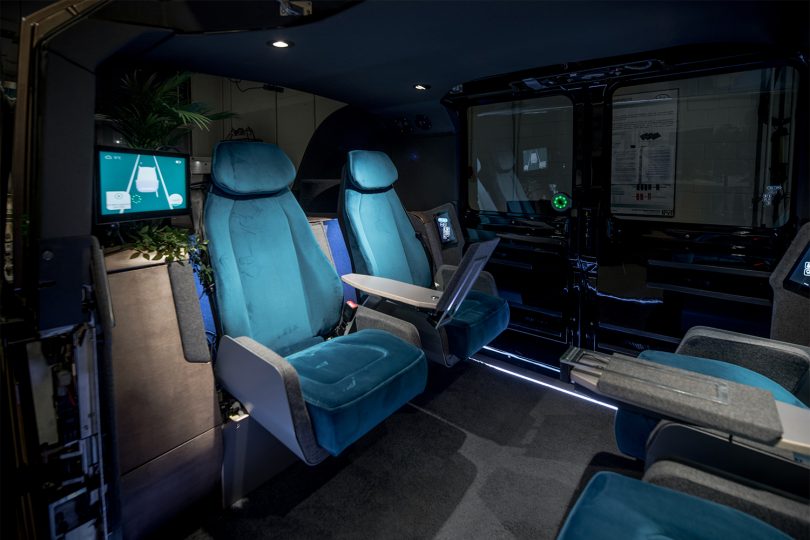Driverless trucks on the road are becoming a reality ATLAS-L4 project reports successful results
- Extensive testing phase yields valuable insights as pioneering work for the use of autonomous vehicles on expressways and motorways
- First application of German law on autonomous driving for trucks
- Three years of research by around 150 engineers lay the foundation for future series applications for Logistics 4.0
- Final presentation with driving demonstrations, a 1,000 m2 exhibition and numerous specialist presentations in Penzing
After three years, the twelve project partners (see below) from industry, science, software development and infrastructure can look back on a successful research and development project called ATLAS-L4 (Automated Transport between Logistics Centres on Motorways at Level 4): Thanks to the work of around 150 engineers, the autonomous truck in road traffic has become a reality!
The consortium had set itself a clear goal in the project, which was funded by the Federal Ministry for Economic Affairs and Climate Protection with a total budget of 59.1 million euros: to bring a Level 4 automated and thus autonomous truck for hub-to-hub transport on motorways. This was based on the law passed in 2021, which generally allows autonomous driving on defined routes under technical supervision, putting Germany in a pioneering role globally.
“We set ourselves a high goal and achieved it,” sums up Dr. Frederik Zohm, Executive Board Member for Research and Development at MAN Truck & Bus. “Taking a holistic approach, we carried out the necessary basic development work to prove that autonomous trucks are realistically feasible.” The law on autonomous driving was applied in practice for the first time in a truck prototype. “The interdisciplinary collaboration proved to be a great advantage because it brought together the expertise of twelve partners. Innovations such as autonomous driving require such cooperation in order to effectively advance future technology in Germany and Europe,” adds Dr. Zohm.
How did the trial phase go?
ATLAS-L4 was launched on 1 January 2022. After the Federal Motor Transport Authority granted the first Level 4 test permit for a commercial vehicle manufacturer in April 2024, the premiere on public roads took place with the first motorway journey of an autonomous truck in Germany – with Federal Minister of Transport Volker Wissing as a prominent passenger. A safety driver was always on board during this and all subsequent test drives. The software was continuously optimised over a long period of time through regular releases and tested extensively in real-world conditions.
Mission accomplished!
The consortium was able to tick off all the project goals: the safety-relevant components for the Level 4 architecture, such as the on-board network, steering and redundant braking system, were set up. A validation concept was created and, at the same time, the control centre for technical supervision was put into operation. Risk analyses and safety assessments for Level 4 – including cyber security and the definition of safety measures such as redundancies and degradation concepts for the autonomous driving system – were carried out. The result: a prototype technology that serves as a blueprint for further projects and series developments.
The Institute for Control Engineering at TU Braunschweig developed concepts for the safe operation of Level 4 trucks and for the technical self-awareness of automated vehicles, among other things.
What’s next?
The work carried out by ATLAS-L4 can therefore be used as a basic concept for future industrial developments, although various details identified by the project still need to be clarified before autonomous trucks can go into series production. “We have done valuable pioneering work by providing practical proof of the technical feasibility of autonomous trucks,” says project coordinator Sebastian Völl, MAN Truck & Bus. “These concepts are now being incorporated into further development work for the series production of autonomous trucks.”
Logistics 4.0 offers a great deal of potential: driverless trucks as part of hub-to-hub automation for shuttle services between logistics centres can make an important contribution to greater efficiency and to the prevention of traffic jams and accidents. Automation concepts also offer a solution to the driver shortage that has been plaguing the industry for years. There is already a shortage of around 100,000 truck drivers.
On 7 and 8 May, the project participants will present the results of ATLAS-L4 to around 200 guests in the presence of representatives from the Federal Ministry for Economic Affairs and Climate Action – with driving demonstrations on the grounds of the ADAC Test Centre for Mobility in Penzing and on the motorway, an exhibition covering around 1,000 m² and scientific presentations.

